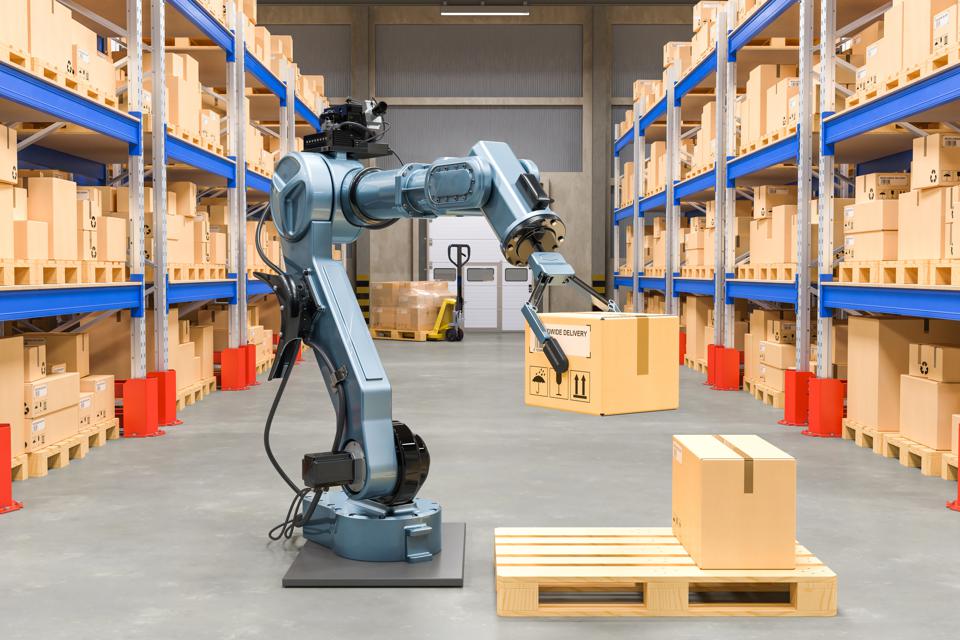
Warehouse robotics is witnessing steady growth, driven by the increasing adoption of automated solutions in storage for food and beverages, consumer goods, retail, and third-party logistics. The collaboration between the e-commerce sector and warehouse robotics is also a major driver of this market, as it allows for developing increasingly sophisticated warehouse automation systems. Additionally, the advent of autonomous mobile robots (AMRs) and the rising popularity of automated guided vehicles (AGVs) are also fueling the growth of this market.
Reforming Warehouse Operations: Increasing Adoption of AMRs and AGVs
One of the most notable trends in the warehouse robotics market is the increasing adoption of AMRs and AGVs. These robots are allowing for the development of more efficient and cost-effective warehouse operations, as they can automate tasks such as picking, packing, and transporting goods. Additionally, the use of AMRs and AGVs is also allowing for the development of more flexible and scalable warehouse operations, which can better meet the changing needs of businesses.
Efficient and Cost-effective: Rising Collaboration between eCommerce Sector and Warehouse Robotics
Another major trend in the warehouse robotics market is the increasing collaboration between the e-commerce sector and warehouse robotics. This is being driven by the growing demand for efficient and cost-effective warehouse operations, as e-commerce businesses look to keep pace with the rapid growth in online sales. Additionally, the use of warehouse robotics is also allowing e-commerce businesses to better meet the changing needs of their customers by providing faster and more accurate delivery of goods.
Advanced Automation: Increasing Preference for Advanced Robots in Warehouses
As the warehouse robotics market continues to evolve, it is clear that there will be a growing demand for advanced robots in warehouses. This is being driven by the surge in the adoption of robots during the COVID-19 outbreak, as businesses look to automate their operations and reduce their dependence on human labor. Additionally, the increasing adoption of industrial automation and control solutions is also contributing to the growth of this market.
Global Perspective: North America to Lead, Europe to hold Second Largest Share
The warehouse robotics market is a global industry, and it is clear that different regions are at different stages of development. Currently, North America is the largest market for warehouse robotics, driven by the rapid adoption of warehouse automation and the presence of major players in the market such as the United States. However, Europe is expected to hold the second-largest market share, driven by the rising adoption of industrial automation and control solutions in the region.
Innovations in Warehouse Automation: A Look at Leading Players’ Latest Developments
The warehouse robotics market is a highly competitive industry with several leading players. Some of the major players in the market include KUKA AG, FANUC Corporation, ABB, and Yaskawa Electric Corporation. These companies have made significant investments in the development of warehouse automation solutions and have a strong presence in the market.
Additionally, there are also several startups and smaller companies that are emerging in the market, such as Locus Robotics and GreyOrange, which are focusing on specific areas of warehouse automation. The competitive landscape is expected to become more intense with the entry of new players and increasing investments in the development of warehouse automation solutions.
In the warehouse robotics market, major players such as Kuka AG, FANUC Corporation, and ABB Limited have been focusing on developing advanced robots for warehouse automation. Recently, Kuka AG announced the launch of its new autonomous mobile robot, LBR iiwa, which is designed for use in the logistics and manufacturing sectors. Similarly, FANUC Corporation has introduced its new autonomous mobile robot, CRX-10iA, which is designed for use in the logistics and distribution sectors.
ABB Limited has also recently launched its new autonomous mobile robot, YuMi, which is designed for use in small parts assembly and other applications in the manufacturing sector. These advancements by leading players demonstrate the increasing focus on developing advanced warehouse automation solutions in the market.
